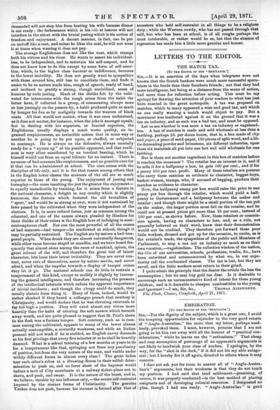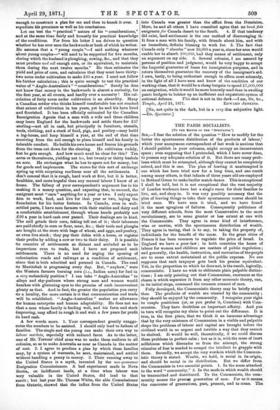EMIGRATION.
[TO THE EDITOR OF THE "SPECTATOR.")
Sm,—For the dignity of the subject, which is a great one, I avoid the tempting opportunities for rejoinder to the very good retorts of " Anglo-Australian," the more that my letter, perhaps need- lessly, provoked them. I must, however, premise that I am not going to let him run away with all the honour of "practical con- siderations," while he leaves me the "enthusiasm." That cheap and easy assumption of patronage of an opponent's arguments is not likely to hoodwink your class of readers. I apologize, by the way, for the "shot in the dark," if it did not hit my able antago- nist; but I hereby fire it off again, directed to others whom it may concern.
I dare not ask you for room to answer all of " Anglo-Austra- lian's " arguments, but their weakness is that they do not touch my position. I had said that land settlement—premising, of course, it was properly conducted—is the best method of placing emigrants and of developing colonial resources. I designated no plan, though I had one ready. " Anglo-Australian " is gool enough to construct a plan for me and then to knock it over. I repudiate his premisses as well as his conclusions.
Iz.,t me test the " practical " nature of his "considerations," and at the same time fairly and honestly his practical knowledge of the conditions. For from his letter I am driven to question whether he has ever seen the backwoods or bush of which he writes. He assumes that a "young couple "—I said nothing whatever out young couples—" will need to be supported for five months, 41uring which the husband is ploughing, sowing, &c., and that they must produce and sell enough corn, or its equivalent, to maintain them during the next twelve months." He then estimates the yield and price of corn, and calculates that they must have thirty- two acres under cultivation to make £60 a year. I need not follow his further calculation ; this is quite enough to test the practical value of " Anglo-Australian's " "considerations." Surely he does not know that money in the backwoods is almost a curiosity, for the first year, at all events, and hardly ever a necessity ! His cal- culation of forty acres under cultivation is an absurdity. Many a Canadian settler who thinks himself comfortable has not reached that extent of cultivation in ten years, yet he and his have lived and flourished. It has been officially estimated by the Canadian immigration Agents that a man with a wife and three children may leave England for the backwoods and settle there for £47 -sterling—not all in cash, but principally in furniture, utensils, teole, clothing, and a stock of food, pigs, and poultry—may build a log-house, and keep himself a year, at the end of that time receiving from the soil enough to place himself and his family in tolerable comfort. He builds his own house and fences his grounds from the trees cut down for the clearing. He cultivates rudely, but he gets enough. And how much need he clear for this ? Ten acres or thereabouts, yielding not ten, but twenty or thirty bushels an acre. He exchanges what he has to spare not for money, but for goods and implements. The stores for this sort of exchange spring up with surprising readiness near all the settlements. I -don't conceal that it is rough, hard work at first, but it is better, 'healthier, and more hopeful than any manual labour I know of at theme. The fallacy of your correspondent's argument lies in his -making it a money question, and expecting that, to succeed, the .emigrant must " earn " anything for a year or two. I only expect him to work, feed, and live for that year or two, laying the foundation for his better fortune. In Canada, even in well- settled parts, I have seen farmers with their stables and dairy and a comfortable establishment. through whose hands probably not 120 a year in hard cash ever passed. Their dealings are in kind. The mill grinds their corn, taking toll out of it ; their labourers are paid chiefly in corn or flour, meat, &c.; their tools and ploughs are bought at the store with bags of wheat, and eggs, and poultry, or even live stock ; they pay their debts with a horse, or register their profits by adding a cow or two to their dairy. It is possible to conceive of settlements so distant and secluded as to be impervious even to trade, but I have not proposed such settlements. There is no need for urging the opening of .colonization roads and railways as a condition of settlement, -since that is both admitted and pursued in Canada. The road
Manitobah is progressing every day. But, "anyhow," were the Western farmers burning corn (i.e., Indian corn) for fuel in a very melancholy position ? I can take " Anglo-Australian " to alleys and sky-parlours where strong men and women would bearken with glistening eyes to the promise of such inconvenient ,plenty as that. And in fact, the greater the population you carry to a locality, the more certain is it that communication and trade will be established. " Anglo-Australian " makes no allowance for human enterprise and human adaptability. He does not see that a man whose family is feeding well, and his farm and stock A few words more. 1. Your correspondent greatly exagge- 'rates the numbers to be assisted. I should only lend to fathers of families. The single and the young can make their own way to labour markets, especially with reduced fares. As to the latter, one of Mr. Torrens' chief aims was to make them uniform to all colonies, so as to make Australia as near as Canada in the matter of cost. 2. I agree to produce a plan by which these families may, by a system of warrants, be sent, maintained, and settled without handling a penny in money. 3. Their running away to the United States is a myth, invented by the non-possumus Emigration Commissioners. A bad experiment made in Nova Scotia, on indifferent lands, at a time when labour was very valuable in the United States, did lead to that result; but last year Mr. Thomas White, the able Commissioner from Ontario, showed that the influx from the United States into Canada was greater than the efflux from the Dominion. More, he and all others I have consulted agree that no bond fide emigrants for Canada desert to the South. 4. If that tendency did exist, land settlement is the one method of discouraging it It fixes a man with his family, with friends about him, and with an immediate, definite blessing to work for. 5. The fact that Canada only "absorbs "now 20,000 a year is, since her area would enable her to absorb 200,000, had they means of settlement, only an argument on my side. 6. Several colonies, I am assured by persons of position and judgment, would be very happy to accept the Imperial guarantee of loans for immigration purposes, and in return themselves guarantee the recovery of the immigrant's aid. I own, lastly, to being enthusiast enough to affirm most solemnly, in the light of all I have seen and know of the condition of our working-class, that it would be a cheap bargain to spend £7,000,000 on emigration, while it would be more honestly used than in swelling panic budgets to bolster up an inefficient and unpatriotic system of national defence. This shot is not in the dark.—I am, Sir, &c., [No, not quite in the dark, but in a very dim subjective light. —ED. Spectator.]



































 Previous page
Previous page